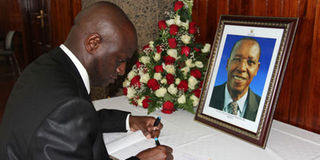Four theories in Mutula mystery

PHOTO | ANN KAMONI Kericho Senator Charles Keter signs the condolence book for Makueni Senator Mutula Kilonzo at the KICC, Nairobi on April 30, 2013. Mr Kilonzo died in his home on April 27.
What you need to know:
- Family pathologist given special clearance to participate in post-mortem examination just hours after arriving from the UK
Seven pathologists on Tuesday took part in the post-mortem examination of Makueni Senator Mutula Kilonzo, whose death has plunged the nation into mourning and speculation.
The team of doctors — one of the largest ever to investigate the cause of a person’s death in Kenya — included British pathologist Calder Ian Maddison, who was flown into the country by the family on Tuesday.
The Medical Practitioners and Dentists Board issued Dr Maddison with a special license allowing him to take part in the examination.
The lead investigator is the Government Pathologist, Dr Johansen Oduor. The examination was delayed on Monday to allow Mr Kilonzo’s relatives to appoint their own doctor.
The other doctors include Dr Luke Musau, Dr Frederick Okinyi of Thika Level 5 and Dr Dorothy Njeru.
Others were Dr Andrew Kanyi Gachie and Dr Emily Rugena.
On Tuesday evening, they addressed the media, saying they had agreed on the preliminary findings and that results of further tests would be ready in eight to 10 weeks.
Also present at the post-mortem were homicide detectives from the Criminal Investigations Department, Assistant Commissioner of Police Pius Macharia and Superintendent Japheth Maingi.
Police told the Nation that they were pursuing four possible causes of death.
“We are exploring suicide, heart attack, poison or an overdose of drugs as all these point to the condition his body was found in,” said a detective on the case, who cannot be named because officers are not allowed to comment on an ongoing investigation.
Mr Kilonzo was found dead lying on his back with some evidence of foaming at the mouth and vomiting on the bed, in the room and a sink in his bathroom.
According to Dr Oduor, poisoning may cause nausea, vomiting, pain, troubled breathing and abnormal skin colour. Poisoning can be through the skin, by breathing, by injection or through a snake bite.
A heart attack can also cause nausea, vomiting and sudden dizziness, he said, adding that foaming on the mouth is commonly associated with epilepsy, trauma and snake bite, among others.
On Tuesday, the Director of Public Prosecutions, Mr Keriako Tobiko, constituted a legal team to guide the investigations.
By Tuesday evening, there was no word on the doctor’s findings, but detectives said they were questioning the workers who were in the compound with the senator on the day of his death.
Detectives will be testing the consistency of the statements given by the workers about what actually transpired.
Senator Johnstone Muthama of Machakos, who is chairing the burial committee, said the rising number of unresolved and sudden deaths had prompted the family to seek the opinion of an independent expert.
Meanwhile, preparations are ongoing for the burial of Mr Kilonzo at his ranch next week. The Provincial Security and Intelligence Committee said more than 600 police officers will be at the ranch.
The team visited the ranch on Tuesday, 47 kilometres from the city, to plan access, parking, security and other details, including the protection of the wildlife on the property.
Mr Kilonzo kept a variety of animals, including cheetahs and lions.
“We want to guarantee security during the burial and that is why we are making early arrangements,” provincial police officer Marcus Ochola said.
The senator was found dead by his long-serving cook, who alerted Mr Chris Musau, the senator’s brother-in-law and proprietor of the neighbouring Maanzoni Lodge.
Workers have told the media that the senator drove himself into the ranch last Friday at 3pm. More than 60 employees live and work on the ranch.
The workers described the senator as “jovial” as he inspected their work.
“He alighted and went round the flower beds, giving instructions here and there on how best the place should look,” one worker said.
He was served his favourite food, maize and beans, but also asked for roast meat, which was prepared for him. He also ordered breakfast for the following morning.
When workers realised that he had not woken up at his usual time of between 9 and 9.30am, they went to his bedroom after calling out and getting no response.
Mr Kilonzo loved country life and spent his weekends at the ranch.
Additional reporting By Fred Mukinda and Bob Odalo




